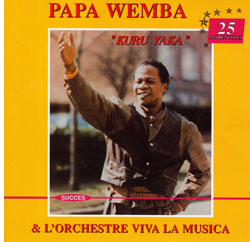|
 Viva la Musica, superb Congolese rumba band, formed 1977. Notable early members: Pepe Bipoli (born Kinshasa, May 14, 1955; vocal), "Espérant" Kisangani Djenga (born Aketi, Congo-Kinshasa, Jan. 15, 1953; died 1990s; vocal), "Patcho Star" Mpasi Samba (born Congo-Kinshasa; drums), Jadot Sombele (born Congo-Kinshasa; vocal), Rigo Star (born Kinshasa, Aug. 28, 1955; guitar), Papa Wemba (born Lubefu, Congo-Kinshasa, June 14, 1949; vocal). Viva la Musica, superb Congolese rumba band, formed 1977. Notable early members: Pepe Bipoli (born Kinshasa, May 14, 1955; vocal), "Espérant" Kisangani Djenga (born Aketi, Congo-Kinshasa, Jan. 15, 1953; died 1990s; vocal), "Patcho Star" Mpasi Samba (born Congo-Kinshasa; drums), Jadot Sombele (born Congo-Kinshasa; vocal), Rigo Star (born Kinshasa, Aug. 28, 1955; guitar), Papa Wemba (born Lubefu, Congo-Kinshasa, June 14, 1949; vocal).
Viva la Musica descends from Zaiko Langa Langa where Viva's leader, Papa Wemba, was an original member. After leaving Zaiko in 1974, Wemba helped to form two new bands, Lokole Isifi and Yoka Lokole, before finally launching his own group, Viva la Musica.
Viva's collection of largely unknown and untested musicians jelled with surprising speed. They produced a clamorous sound, much like Zaiko, with Wemba leading an ensemble of singers urged on by the riffing guitar of Rigo Star. Like Zaiko, Viva dropped the standard horn section used by older Congolese bands, and the sebene, Congolese music's instrumental break, was often speeded-up and energized by cries of animation. "Mère Supérieure" (mother superior), an early hit that derided women's purported hypocrisy, was voted 1977's best song by Kinshasa music writers. Viva itself, still in its first year of existence, won the best band award.
On two notable occasions, Wemba left Viva to flounder on its own: once in 1979 to perform with the great Tabu Ley for several months, and again in 1982 to record solo in Paris. Viva also suffered its share of desertions. A 1981 walkout of four musicians, including popular singer Dindo Yogo, resulted in the creation of the band Langa Langa Stars. Late in 1982, ten members of the group led by singer Emeneya Mubiala left to form Victoria Eleison.
In the early eighties Viva became the focal point for a movement of the style conscious called la sape (from the French sapes, meaning clothes or togs; Congolese liked it as an acronym for "society of ambiancers and persons of elegance"), sparked in large measure by the dapper Wemba himself. Practitioners of the fad were known as sapeurs and wore the latest creations of French and Italian fashion houses. Viva's "Matebu" from 1983 extolled the labels currently in vogue.
The mid-eighties version of Viva included a trio of future stars, singers Reddy Amisi, Lidjo Kwempa, and Litemo Luciana. In a radical departure from the usual romantic fare, the band released "L'Esclave," the slave, in 1986, a song that denounced the exploitation of Africa. The band, already a fixture in Europe, played in Japan in 1986. A return visit the next year turned out to be a farewell tour. Soon afterward, Wemba announced that he was letting his musicians go in order to create a more international sound as a solo artist. When Wemba's new effort failed to produce the hoped for breakthrough, he resurrected the Viva La Musica name for Foridoles (1994) and Pôle Position (1995), albums more recognizable as Congolese rumba recorded with Paris-resident Congolese session musicians and several Viva veterans such as Reddy Amisi, Stino Mubi, and Joly Mubiala.
Singers Stino, Gloria Thukadio, and Lidjo Kwempa tried, in vain, to establish their own group, Cour des Grands, independent of Viva around the beginning of 1998. Wemba lured them back to Viva, calling the, more or less, reunion Viva la Musica Cour des Grands. The band continued in this vein into the early 2000s, recording sporadically and unevenly, frequently in combination with Wemba's several other groups.
In its best days, up to the mid-1990s, Viva la Musica was the most successful of the offshoots from Zaiko Langa Langa. The charismatic Wemba and his companions created a look and a sound that enjoyed immense popularity, both at home and abroad. Viva's formidable body of work continues to sell in re-release, an indication of the support Viva's version of the Congolese rumba still enjoys.
© 2011 Gary Stewart
SELECT DISCOGRAPHY
Kuru Yaka (Glenn GM312001) seventies and eighties recordings reissued 1996; 8é Anniversaire (Plus de Paris EPP02) 1984 recording reissued 1996; Biloko ya Moto (Mayaula NMC46302) eighties recordings reissued 1996; La Naissance de L'Orchestre Viva la Musica (Ngoyarto NG026) seventies recordings reissued 1997; Ndako ya Ndele (Sonodisc CDS7007) seventies recordings reissued 1997; Foridoles (Sonodisc CD72424) 1994; Pôle Position (Sonodisc CDS8815) 1995; Papa Wemba & Viva la Musica: The First Twenty Years (Stern's STCD3019-20) 2004.
SELECT BIBLIOGRAPHY
C. Stapleton & C. May, African All-Stars (London, 1987); T. Cheyney "The Extraordinary Papa Wemba," The Beat (vol. 8 no. 6, 1989); B. Eyre, "Papa Needs a Brand New Bag," Option (no. 44, May/June, 1992); M. Sinnock, "Et Que Viva la Musica," The Beat (vol. 15, no. 3, 1996); M. Sinnock, "Viva Generation X," The Beat (vol. 17, no. 6, 1998); G. Stewart, Rumba on the River (London and New York, 2000).
|

